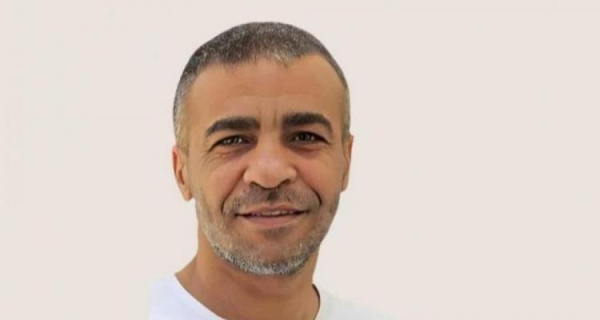
In his last message before entering a coma, the martyr prisoner Nasser Abu Hmeid, 50 years old, said, "I am going to the end of the road, but I am reassured and confident that first, I am a Palestinian and I am proud, leaving behind me a great people who will not forget my cause and the cause of the prisoners."
Early Struggle:
Abu Hmeid spent most of his life as a prisoner in occupation jails, after planning and carrying out resistance operations against the occupation and its objectives since he was 11 years old.
He was born in 1972 in the Nusseirat refugee camp in Gaza, then moved with his family to live in the Amari camp near Ramallah in the West Bank, where he began his activist activities.
Abu Hmeid's first arrest was in 1981, when he was only 11 years old, and he spent four months in occupation prisons after throwing a Molotov cocktail at an Israeli army patrol.
During the First Intifada in 1987, Abu Hmeid found his space to participate in resistance activities again, although he was still a child.
After his release from prison, he had decided to continue with the resistance work, and it wasn't long before he became the number one wanted by the occupation army. During that time, the occupation demolished his family's house in a precedent-setting action. Later, he was arrested and sentenced to two and a half years in prison. He was then re-arrested for the third time in 1990, and the occupation sentenced him to nine life sentences for killing collaborators with the Israeli occupation.
He spent four years of his long sentence, and with the Oslo Agreement in 1995, he was released as part of the agreements. Less than a year later, he was rearrested and sentenced to three years in prison.
The Masked Lion:
A year after his release, the Second Intifada erupted in 2000, and Abu Hmeid joined it, founding the Al-Aqsa Martyrs Brigades, affiliated with the Fatah movement, in coordination with all the movement's leadership in the West Bank and the Gaza Strip on the fourth day of the uprising. Once again, Abu Hmeid found himself on the wanted list after carrying out and planning a series of martyrdom operations inside Israel, during which he survived assassination attempts. He was the first wanted person to be targeted in an assassination attempt by a vehicle bomb.
During that period, Abu Hmeid became known as "The Masked Lion." His brother Naji says about this nickname, "It may be because of the mask he constantly wore, or the general concept of the movement he founded," referring to the Al-Aqsa Martyrs Brigades.
In 2002, Abu Hmeid was arrested after his house in Kafr Aqab, north of occupied Jerusalem, was besieged, and he underwent a harsh interrogation before being sentenced to seven life sentences and 50 years in prison.
Prison and Illness Journey:
The last 20 years of prison were not easy for Abu Hmeid, who was classified from the beginning of his detention as one of the most dangerous detainees. He emerged as one of the leaders of the National Liberation Movement "Fatah" and the organizational bodies of prisoners in jails, which made him the leader of prisoners' protests, battles, and strikes, subjecting him to years of isolation and punitive measures.
One of the most prominent punitive measures imposed on him was depriving him of visiting his family and meeting his brothers, six of whom were behind bars during some years.
During his years in prison, he also experienced stages of medical neglect. He was arrested injured and needed treatment, which the Israeli prison authority procrastinated in providing.
The most prominent medical neglect, as his brother Naji Abu Hmeid says, began after symptoms of cancer appeared in his chest. Despite his condition being diagnosed initially as a benign tumor in his lungs, the Israeli prison authority procrastinated in conducting the necessary tests to determine the type and severity of the tumor.
Not only that, but the first announcement from the prison authority stated that he had a benign tumor, before his condition worsened further and additional tests revealed the truth of his advanced-stage cancer.
Despite his deteriorating health and his body rejecting chemotherapy, with doctors' reports indicating the possibility of his martyrdom at any time, the prison authority refused to release him, ignoring all popular, official, and international demands.
Abu Hmeid comes from a family that migrated from their original town, "Al-Safiyya," in the district of Jaffa, seeking refuge in Gaza City, and then moving to the Amari refugee camp in the West Bank. He is the third son in a family of 10 brothers and two sisters.
After his first arrest in 1981, his brothers were individually and collectively subjected to arrest, and his brother Abdel-Mun'im was martyred in 1994.
During the Second Intifada, seven of them were in prison at the same time, and now four of his brothers (Nasser, Mohammed, Shareef, and Islam) are languishing in occupation prisons, all facing life sentences.
As revenge against Abu Hmeid and his brothers, the occupation demolished the family's home five times, the latest being in 2019 after the arrest of his youngest brother, Islam, and his sentencing to life imprisonment for allegedly killing an Israeli soldier from the "Duvdevan" unit of the occupation army.
Abu Hmeid did not lead a normal life; he spent 34 years of his life in prisons and 5 years on the run. However, in the few periods he lived outside of prison, he took care of a horse he bought and grew very attached to. He always advised his brothers to take care of it, as his brother Naji says, "If Nasser had lived a normal life, he would have been a horse trainer, as he loved and was passionate about them since his childhood."

Share your opinion